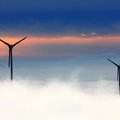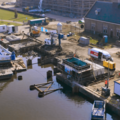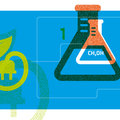News
19 April 2022
TU Delft intensifies research into floating wind turbines

If it is up to the European Commission, all the energy used will come from renewable sources by 2050. Achieving this goal will require the large-scale use of floating wind turbines, says Axelle Viré, wind expert at TU Delft. ‘Although the technology is still in its infancy, it has enormous potential,’ she explains. ‘To capitalise on this potential, TU Delft is launching the Floating Renewables Lab: a lab facility that will tie together all the elements of the development chain for floating wind turbines and other offshore renewables with the help of numerical models and AI.’
14 April 2022
The battle of the Amsterdam quayside bulge

The canals and quaysides in historic cities such as Amsterdam, Delft and Utrecht make a pretty picture. In order for these often busy cities to remain safe, the quay walls, some over 300 years old and built on wooden piles, need to be well maintained.
08 April 2022
TU Delft and TNO prepare industry for scale-up phase of clean factory

Oil and gas shortages are not only pushing up the prices of gas and petrol, but also plastics, medicines and cosmetics. To make our society less dependent on fossil fuels and combat climate change, the chemical industry needs to change radically. In recent years, TU Delft and TNO have laid the foundation for cleaner production processes in the chemical industry. The new e-Chem partnership is now taking this a step further by actually constructing a clean factory of the future.
07 April 2022
Sharlene en Lieke droegen bij aan het IPCC rapport: ‘een onvergetelijke ervaring’
En dan ben je ineens een van de schrijvers van het indrukwekkende IPCC rapport deel II over impact, adaptatie en kwetsbaarheid dat afgelopen februari werd gelanceerd. Het overkwam TBM onderzoekers Sharlene Gomes en Lieke Brackel. Beiden hadden de ervaring niet willen missen.
04 April 2022
Immediate acceleration of global climate action needed to realise 1.5°C goal

The goal of the Paris Agreement on climate change, limiting global warming to a maximum of 1.5°C, is becoming increasingly unrealistic unless countries collectively decide to take action immediately. This is the opinion of the five Dutch climate experts who contributed to the IPCC report that appeared today. Such an acceleration and strengthening of policy measures is still possible, but requires a far-reaching transformation of the systems that underpin our economy, including energy, industry, transport, and agriculture. The coming years will be crucial in this respect. These are some of the most important conclusions from the IPCC report published today.